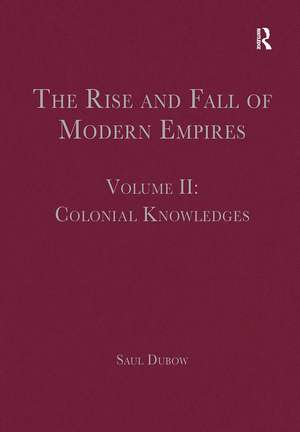The Rise and Fall of Modern Empires, Volume II: Colonial Knowledges: The Rise and Fall of Modern Empires
Editat de Saul Dubowen Limba Engleză Paperback – 30 noi 2022
| Toate formatele și edițiile | Preț | Express |
|---|---|---|
| Paperback (1) | 243.54 lei 3-5 săpt. | +36.09 lei 4-10 zile |
| Taylor & Francis – 30 noi 2022 | 243.54 lei 3-5 săpt. | +36.09 lei 4-10 zile |
| Hardback (1) | 513.27 lei 6-8 săpt. | |
| Taylor & Francis – 5 iul 2013 | 513.27 lei 6-8 săpt. |
Preț: 243.54 lei
Nou
Puncte Express: 365
Preț estimativ în valută:
46.60€ • 48.79$ • 38.56£
46.60€ • 48.79$ • 38.56£
Carte disponibilă
Livrare economică 18 martie-01 aprilie
Livrare express 01-07 martie pentru 46.08 lei
Preluare comenzi: 021 569.72.76
Specificații
ISBN-13: 9781032402666
ISBN-10: 1032402660
Pagini: 596
Dimensiuni: 174 x 246 x 34 mm
Greutate: 0.94 kg
Ediția:1
Editura: Taylor & Francis
Colecția Routledge
Seria The Rise and Fall of Modern Empires
Locul publicării:Oxford, United Kingdom
ISBN-10: 1032402660
Pagini: 596
Dimensiuni: 174 x 246 x 34 mm
Greutate: 0.94 kg
Ediția:1
Editura: Taylor & Francis
Colecția Routledge
Seria The Rise and Fall of Modern Empires
Locul publicării:Oxford, United Kingdom
Cuprins
Contents: Introduction; Part I The Colonial Situation: The colonial situation: a theoretical approach, G. Balandier; Social theory and the study of Christian missions in Africa, T.O. Biedelman. Part II Language and Control: The command of language and the language of command, Bernard S. Cohn; Knowing the country: empire and information in India, C.A. Bayly; The prose of counter-insurgency, Ranajit Guha. Part III Categorical Knowledge: Two European images of non-European rule, Talal Asad; The ideology of ’tribalism’, Archie Mafeje; Race and the webs of empire: Aryanism from India to the Pacific, Tony Ballantyne. Part IV Measurement and Mapping: Number in the colonial imagination, Arjun Appadurai; ’Kafir time’: preindustrial temporal concepts and labour discipline in 19th-century colonial Natal, Keletso E. Atkins; Mapping an empire: cartographic and colonial rivalry in 17th-century Dutch and English North America, Benjamin Schmidt; Scientific exploration and empire, Robert A. Stafford. Part V Indigenous Knowledge: Environment, Medicine, Landscape: Introduction: disease, medicine and empire, David Arnold; Natural sciences, Patrick Harries; Colonial conservation, ecological hegemony and popular resistance: towards a global synthesis, Richard H. Grove; Beyond the colonial paradigm: African history and environmental history in large-scale perspective, William Beinart; Cars out of place: vampires, technology and labour in east and central Africa, Luise White. Part VI The Circulation of Knowledge: Global knowledge on the move: itineraries, Amerindian narratives, and deep histories of science, Neil Safier; A commonwealth of science: the British Association in South Africa, 1907 and 1929, Saul Dubow; Visible empire: scientific expeditions and visual culture in the Hispanic Enlightenment, Daniela Bleichmar; Name index.
Notă biografică
Saul Dubow is Professor of African History at Queen Mary, University of London. He is the author of several books about modern South Africa which deal with ideas and knowledge, including A Commonwealth of Knowledge. Science, Sensibility and White South Africa 1820-2000 (Oxford, 2006); Scientific Racism in Modern South Africa (Cambridge, 1995), and an edited volume Science and Society in Southern Africa (Manchester, 2000). He is currently completing a New History of Apartheid for Oxford University Press.
Descriere
This volume reproduces key historical texts concerning `colonial knowledges’. The use of the adjective 'colonial' indicates that knowledge is shaped by power relationships, while the use of the plural form, ’knowledges’ indicates the emphasis in this collection is on an interplay between different, often competing, cognitive systems. George Balandi





